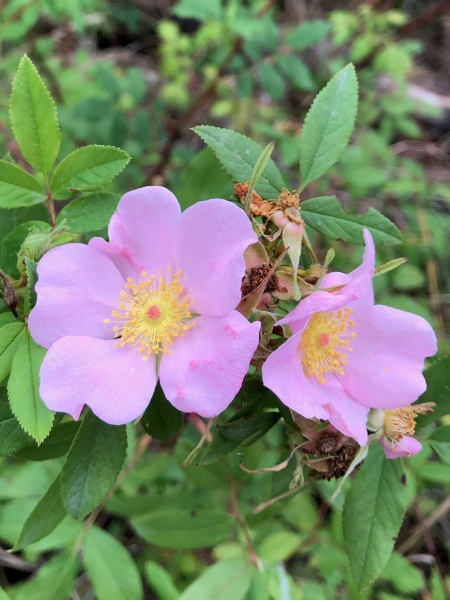
Source: mmmavocado
Rosa palustris
Swamp Rose
Rosier palustre
No seeds available for this plant.
We currently accept seeds for this plant
Bloom Colour: Pink
Bloom Period: Jun - Jul
Max Height: 5.0 feet
Max Width: 4.0 feet (spreads by rhizome)
Light Condition:
 More than 6 hours of direct sun a day
Soil conditions:
More than 6 hours of direct sun a day
Soil conditions:
 Tolerates wet soil condition
Tolerates wet soil condition
 More than 6 hours of direct sun a day
More than 6 hours of direct sun a day
 Tolerates wet soil condition
Tolerates wet soil condition
Lifespan:
Perennial
plants that will that come back year after year
Gardener Experience:
 Self-seeding
Self-seeding
 Self-seeding
Self-seeding
Landscape Uses:
 Suitable for wetland garden
Suitable for wetland garden
 Can be used as a hedge
Can be used as a hedge
 Suitable for wetland garden
Suitable for wetland garden
 Can be used as a hedge
Can be used as a hedge
Ecological Benefits:
No ecological benefits information available.
Tolerates:
 Tolerates limestone conditions
Tolerates limestone conditions
 Tolerates juglone conditions
Tolerates juglone conditions
 Tolerates transplantation
Tolerates transplantation
 Tolerates limestone conditions
Tolerates limestone conditions
 Tolerates juglone conditions
Tolerates juglone conditions
 Tolerates transplantation
Tolerates transplantation
Special Features and Considerations:
 This plant produces burs
This plant produces burs
 This plant produces burs
This plant produces burs
Plant Location
Ecological Benefits
Butterflies Supported by Rosa palustris
- Catocala ultronia (Ultronia Underwing)
- Olethreutes permundana (Raspberry Leafroller)
Specialized Bees Supported by Rosa palustris
No bee data available for this plant.
Plants that grow in similar conditions, that bloom at the same time.
Complementary Plants
- No complementary plants found.
Substitute For Non-Native Plants
No substitute plant data available for this plant.
Sowing Information
Download Seed Envelope Labels (PDF)
- Sowing depth: Sow just below surface
- Sow anytime
- Stratification duration: 0 days
- Self-seeding
- Notes: Double dormancy. Needs scarification if started in fridge.
Harvesting and Seed Sharing
- Harvest start month: September
- Harvesting indicator:
- Berries are ripen and easily fall off or have fallen off
- Harvesting:
- Squeeze berries to extract seeds, wash with soapy water, rinse throroughly
- Seed viability test:
- No test needed before donating
- Packaging measure: A dozen (12) seeds (eyeball)
- Seed storage:
- Air dry in paper bag or open container, for a few days until crisp
- Shake seeds to move them once in a while to prevent molding
- Cultivar: Yes, do not donate unless you know source, and there are no known cultivars in your garden or at proximity
- No harvesting video available at this time.
Toxicity Notes
Not toxic as per ASPCA.


